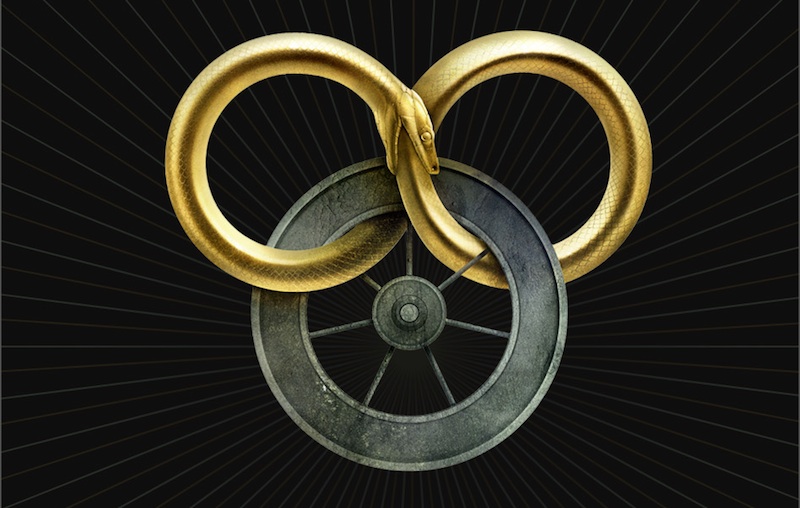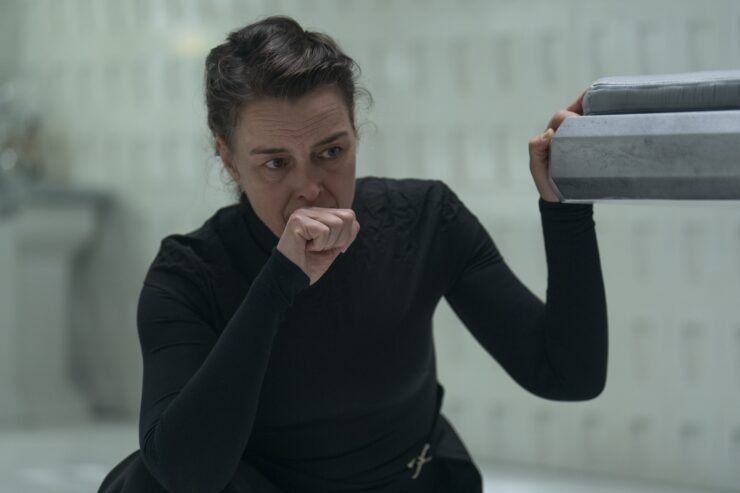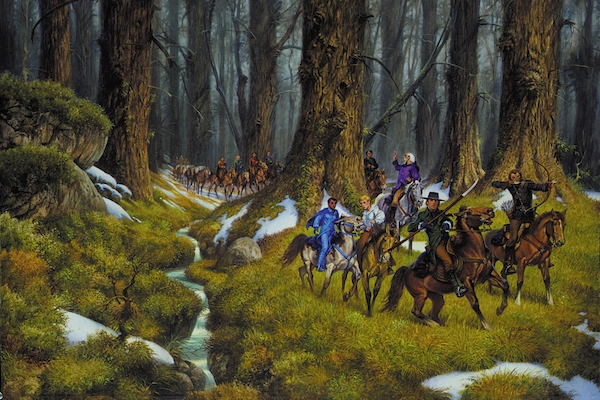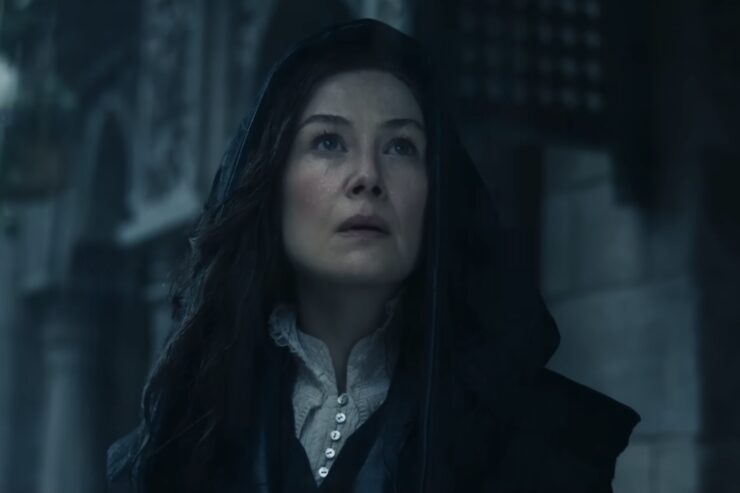In the beginning of Chapter 35 of The Fires of Heaven, Elayne Heals Nynaeve’s black eye while she sleeps, without Nynaeve’s permission and with full knowledge that Nynaeve would actively refuse Elayne’s ministrations if she were awake. It’s a small moment, focused on Elayne’s boredom and on her evaluations of her strength in various applications of saidar, almost not worth mentioning. Until you consider the larger context of Nynaeve’s story arc, that is. Then a pattern begins to emerge that I find troubling.
Since Elayne and Nynaeve began traveling with Valan Luca’s menagerie, Nynaeve’s life has become increasingly out of her control. She doesn’t have a clear direction to go next, and she’s depressed and struggling with herself and her choices, or lack thereof. Afraid to retreat but unable to find any momentum to take her forward, she’s stuck treading water, and it was clear even before Moghedien’s attack that, sooner or later, something had to give.
It’s a narrative journey that makes a lot of sense for Nynaeve’s character. She is someone who is unable to face most of her emotions, burying fear, doubt, and even desire under a layer of stubbornness and anger that serves her well… right until it doesn’t. Her block against channeling is part of this pattern; anger helps her circumvent it in certain moments, but her refusal to engage with her fear of the One Power and of her own uncertain future continues to hold that block in place. Now, as time and events wear on and the fight against the Dark becomes more complicated, the limitations of Nynaeve’s stubbornness are becoming more apparent. At least part of her journey must be her learning that lesson. Learning to listen to herself, and to others. Learning to compromise, to accept that fear and failure are part of life. That she can’t protect everyone at all times. That her perfectionism won’t always serve her, and that she can’t hide from the world by continually putting up a prickly, unreasonable front.
Buy the Book
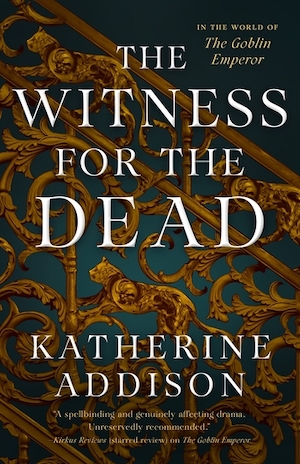

The Witness for the Dead
I am so here for that journey. But I’m worried that one aspect of Nynaeve’s lesson is being set up to come from the continued violation of her personal autonomy.
Nynaeve’s words to Luca in Chapter 33 of The Fires of Heaven are one of my favorite moments for her thus far in the series. “It doesn’t take much bravery to stand like a stump,” she tells him when he praises her performance in the knife throwing act. “I am no braver than I have to be.” These sentences say so much about Nynaeve and how she views herself—she can be such an ass at times, but we see here how much of her strength she actually devalues. Nynaeve has many flaws that she doesn’t recognize in herself, but if we’re being fair, she doesn’t recognize most of her best characteristics either.
She’s also only agreeing to the knife performance because she has no choice. And she is forced into the red dress even though she never agrees to it at all.
Acquiescence under duress, be it threat or merely Luca’s frustrating persistence, isn’t actually consent. Nynaeve is basically trapped at the menagerie, even if some of that comes from her own reluctance to go back to Tear. She doesn’t enjoy performing the way Elayne does, and she is miserably unhappy. And Luca won’t take a gentle no for an answer, not in his creepy suit towards her or in what he wants from the performance. Whenever Nynaeve gives him an inch, he takes a mile, turning the rehearsal into an agreement to perform and refusing to take no for an answer when it comes to the aforementioned red dress. And what’s even worse is the way the other women support this state of affairs: Elayne scolds Nynaeve for leading Luca on, and Birgitte equates Nynaeve’s desire for a more modest dress to shame over her own womanhood.
Now, I am perfectly aware that women are just as capable as men of having problematic opinions when it comes to other women’s decisions about their own bodies. Birgitte has some very classic “women in a man’s world” perspectives, as someone who has spent her life largely in the sphere of soldiers and that specific kind of culture. But there is an implication in the narrative that her opinion on the matter is more “true” or fair because she is also a woman. In fact, this type of implication is all over The Fires of Heaven; women are often assaulting each other in a manner that can easily be taken as sexualized, but because it is the violence of women on women, it is made easier to overlook. At best, it suggests that ladies themselves are to blame for the cultural subjugation of women in society. At worst, it suggests that this behavior isn’t problematic at all because it’s a woman enacting it, not a man.
If Rahvin or Sammael had been the one to disintegrate Nynaeve’s clothes before contorting her naked body into a painful shape and torturing her, it would be almost impossible to escape the sexual implications of that choice. The same would be true if the Whitecloaks had captured and interrogated Leane and Siuan and left them naked in a dungeon, instead of Elaida.
It even happens with the heroes. If Rand had stripped Nynaeve’s clothes off and created nightmare rape monsters to attack her in Tel’aran’rhiod, it would be obvious how not okay that is. But because it’s Egwene, it’s much easier to “excuse” it. She was trying to teach Nynaeve a lesson, we think to ourselves, one Nynaeve desperately needs. She is helping, just like she was helping when she forced Nynaeve to drink the bad tasting potion and learn to stop lying so much.
It’s for Nynaeve’s own good.
It’s better than what will happen to her if she doesn’t learn her lesson.
She brought it upon herself.
The narrative of The Wheel of Time seems to view physical-punishment-as-a-teaching-moment as a perfectly acceptable and even moral choice. The incidents we see of this in the first five books are almost all suffered by women, and are at least somewhat sexually suggestive. Novices and Accepted are often described as walking stiffly and unable to sit comfortably after a visit to Sheriam’s office. Siuan is threatened with having her “bottom switched” by Gareth Bryne, a man who is romantically interested in her and who, in the very same conversation, allows her believe that he means to rape her as a tease. The Maidens strip Isendre naked when they catch her stealing and force her to walk around in front of everyone. Even women’s own minds turn against them; in Tel’aran’rhiod a stray thought about someone you love inevitably results in their necklines plunging downward without their knowledge.
Of course, the implication there is that the character, on some level, wants that lower neckline or sheerer gown, even if she’s embarrassed when it happens. It’s the same way the narrative suggests that Min would like to wear a dress for Rand, and learn to flirt like a Domani, even though she has been entirely consistent about her disdain for dresses since we met her. It’s the same way the narrative implies that Nynaeve does kind of like Luca’s advances, despite showing her fleeing from them at every opportunity.
The Wheel of Time is written entirely in close 3rd person point of view, shifting between a myriad of protagonists and side characters. It results in a rich tapestry of voices and perspectives, but it’s a mistake to assume that, because every thought and comment comes from the perspective of a specific individual, the narrative isn’t making any larger declarative statements. One can claim that Birgitte’s opinion about Nynaeve’s neckline is the archer’s alone, but there is nothing in the narrative that disagrees with Birgitte’s claim—in fact, it supports her in a number of small yet poignant ways.
Think of how much time the books spend on the rage that Rand and Mat and Perrin hold against Moiraine for laying hands on them and Healing them without their permission. Mat literally gets an ancient talisman to protect him from such things. Rand’s fear and mistrust of Moiraine and the possibility of the Tower manipulating him comes in part from the seeds Ishamael sowed in his mind, but also from the fact that Moiraine continually acted upon him and directed him without his consent, telling him only what she believed he needed to know; her assumption that it is her right to Heal without question is just one example of a larger problem. The series is not unsympathetic to Moiraine, nor does it paint her as the villain Ishamael made her out to be, but we are with Rand in his righteous anger and his fear of being controlled. Other men understand it, and support it, and even experience it in their own way. Think of Gareth Bryne knowing that he’s been trapped by the Aes Sedai at Salidar. Think of Thom allying himself with the boys against Moiraine because of what happened to his nephew; she shares the blame by association because she is Aes Sedai, but Thom doesn’t hate the boys for being the same kind of peasant folk that turned against Owyn.
No one defends Nynaeve. Luca pursues her romantically while she tries to avoid him, then proves that he won’t respect a direct no when she doesn’t want to wear the dress or be in the knife-throwing performance at all. Then Elayne tells her off for leading Luca on after watching her try to get away from him all evening. Birgitte tells her that her desire to not have her breasts prominently exposed means she is ashamed of her own body and gender, even after Nynaeve just had all her clothing violently and traumatically removed by Moghedien. Both Birgitte and Elayne consider that the antidote to Nynaeve’s despair is for her to get beaten up again—and why shouldn’t they, since that is this world’s answer to all personal problems?
And sure, one could argue that the narrative is suggesting some part of Nynaeve does like Luca’s attentions. But if that’s true, then it’s worse, because now the story is telling us not to believe a woman’s gentle rejections… because really she likes it, and is just playing hard to get.
At the same time that Nynaeve’s friends are threatening to beat her depression out of her and shaming her for wanting a higher neckline on her gowns, Moiraine—the woman who has given her life to finding and guiding the Dragon Reborn, who has saved his and his companions’ lives half a dozen times at least—has been forced to swear to an exacting, even oppressive level of obedience to him merely to get him to listen to her advice. She has been reduced to desperate begging for his attention, and even then his discomfort over the situation is centered by the narrative. And when Egwene asks Moiraine why she would let herself be put in such a position, her answer is simple.
“Because I remembered how to control saidar.”
To be a woman, The Wheel of Time tells us, is to surrender. It is built into the very fabric of existence, and it is the reason Nynaeve cannot control her own Power. The very thing I enjoy most about Nynaeve is that she is written more like a standard male hero—she is stubborn, ungracious, and hopeless at understanding her own feelings. I’m quite happy to have a female character take the journey of learning compassion and empathy and how to handle her emotions like an adult, without lashing out. But being an Aes Sedai is not about growing—we’ve been told outright that it is about being broken down and rebuilt. And I think that is what the narrative is doing to Nynaeve, punishing her for her stubbornness by denying both her power and her bodily autonomy until she learns to submit.
Submission is not an inherent part of femininity or womanhood, and assault—be it physical or sexual, or both—is not a teaching tool, be it at the hands of a mentor or the at will of the Wheel.
Sylas K Barrett will return next week with your regularly scheduled Reading the Wheel of Time.










